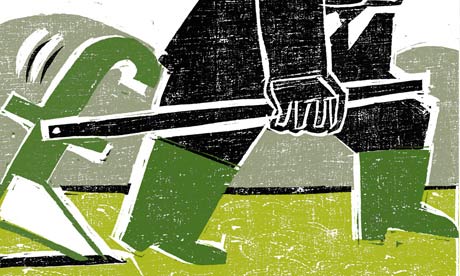Bopara and the cultural conundrum
Why does Britain still await its first batting star of Asian stock?
July 3, 2013
A

| |||
Related Links
Players/Officials: Moeen Ali | Ravi Bopara | Varun Chopra |Nasser Hussain | Wasim Khan | Monty Panesar | Samit Patel |Adil Rashid | Bilal Shafayat | Owais Shah | Graeme Swann
Teams: England
| |||
"Oh, Raa-vee Bow-pah-rah... Oh, Raa-vee Bow-pah-rah... " As the chant went up to the tune of The White Stripes' "Seven Nation Army", again and again and once more with feeling, it was possible to glimpse a brave new world. With all due respect to Nasser Hussain, who captured the nation's heart with splenetic disciplinarian leadership and spiky spunk rather than runs, was last Tuesday's frolic at The Oval going to go down as the night we finally acclaimed a British Asian batting hero?
It didn't quite turn out that way. First came the Champions Trophy final, then an even more agonising loss to New Zealand. For the second match running, Bopara took his team to the brink of victory and fluffed his lines. So much good came out of those two assertive, cold-eyed knocks, it would be heartless to harp on about their anti-climactic denouements, but the scoreboard is the most damning and ruthless of bottom lines.
We've been here before, of course, and not just with Bopara, who has defied those who contended that his fitful international career had ground to a permanent halt in Pallekele last October. In that same World Twenty20 fixture, while Samit Patel was battling Sri Lanka alone on that burning English deck, it was tempting to imagine, once more, that a corner had been turned. Here, after all, was a British batsman of Asian origin not simply capable enough to command regular selection but comfortable enough to be himself, to strut his stuff and dominate. Sadly, Patel's ensuing tribulations in India confirmed that the no-entry sign remained intact.
Call it the Shah Question: why does Britain still await its first batting star of Asian stock - or, rather, its first not called Sachin, Rahul, or Virender? Given that Owais Shah, one of about four and a half Englishmen to make even a small splash in the IPL, was overlooked for the last World Twenty20, a tournament that could and should have been the making of this most feckless yet dazzling of Anglo-Asian cricketers, the question of courage, of whether to fear failure or keep its extensive tentacles at bay, is not one that can be lightly dismissed.
But why? For all Monty Panesar's cult following, for all the progress made lately by Moeen Ali and Varun Chopra, for all Adil Rashid's nascent revival, for all the abundant promise of Azeem Rafiq, Shiv Thakor and Kishen Velani, it remains difficult to subdue the sense that the existing resources are not being tapped as well as they might. It would also be naïve to pretend that all cultural differences have been erased.
Unsurprisingly, being a Muslim may still be a major roadblock, as exemplified, perhaps, by the sad decline ofBilal Shafayat. We may never know how much his failure to live up to the predictions of some sage judges is traceable to the prayers he once shared with Pakistani opponents during an Under-19 tournament.
Better placed than most to comment is Wasim Khan, the first British-born son of Pakistani parents to play professional cricket, author of an award-winning autobiography, and now chief executive of Chance to Shine, for which he recently won a deserved gong. The way he sees it, Muslim cricketers have external pressures unfamiliar to the majority on the county circuit, such as being the breadwinner for an extended family or the perplexing duality of living a westernised life in the dressing room and a traditional one at home, even if county menus do now encompass halal meat.
For the best part of the previous decade, Dan Burdsey, my University of Brighton colleague, plunged into vexatious waters by examining the experiences of British Muslims in the sporting arena. Cricket, to him, is the "notable exception" to the general rule. "I guess I'm just a bit stronger," one interviewee, a professional who insisted on anonymity, said in reference to his faith. "Maybe if I become more successful," said another, "people will look at Muslims differently, and maybe it will change, you know, the stereotype and the perspective of how British Muslims are."
| Cricket's first Anglo-Asian superstar, one strongly suspects, will need a spot of brashness to go with the thick skin | |||
For all the priceless perspectives he gleaned, Burdsey was honest enough to acknowledge the shortcomings of his research: "There were occasions when participants seemed to be holding back from completely explicating their feelings around experiences of prejudice and some of the more problematic aspects of gaining inclusion in the sport." He attributed this, among other factors, to "a reluctance to talk openly to people who do not directly share their experiences; a belief that their position as professional sportsmen may be compromised through open dialogue on controversial topics; or a deliberate attempt to avoid being viewed as fulfilling dominant stereotypes of young Muslim men... and coming across as acrimonious about their engagement with predominantly white, British institutions."
Hussain, the most successful British Asian cricketer, if always a bit too grimly focused to be a batting hero per se, highlights the fear factor. "The Asian family's love of cricket means you get lots of opportunities but it also gives you a fear of failure," he told the Cricketer a few months back. The experience was personal as well as general: he often lied to his father, who ran a popular cricket school in the east London suburbia of Ilford, about how many he had scored. "If your father has driven six hours for an Under-11 game at Taunton and you nick a wide one, it can be a long journey home. It makes you intense and quite complicated."
Hussain believes Bopara, Patel, Shah and Mark Ramprakash were similarly cursed. "Ravi says he has changed, that cricket has become more of a hobby, but I suspect there's bluff in that. He would still love to be a superstar."
Though he has charmed us with his wickets and unbridled enthusiasm, Panesar doesn't quite qualify: superstars should only be conversant with ridicule on the way up or down. He is, rather, a folk hero, in large part because, being a fairly useless fielder and a bit of a dunce with the bat - and hence not at all like the ebullient Graeme Swann - he makes us giggle. As for those singularly joyous celebrations, they evoke empathy: not a superstar's due but an underdog's just desserts. Outbowling Swann in India merely served to amplify his misfortune in being the No. 2 spinner in what is habitually a one-twirler XI. In the Tendulkar Era, a batsman will have to break the mould.

| |||
Bopara and Shah have been the prime candidates. As batsmen they are more adventurous, more liable to reverse the course of a game with thrusts than parries, more bedroom-poster-friendly, more brittle. Duncan Fletcher may have cause to see Shah as one of his chief failures as England coach, but it is also entirely plausible that the most damaging hurdle was Shah's family baggage. Bopara has scarcely lacked chances, and if treating one's job as a hobby leads to profoundly injudicious shots in each innings of the first Test of a series, as happened against South Africa last summer, maybe it isn't quite the best policy. In fairness, at the time a crisis at home was looming far too large.
Which brings us to the f-word: flaky. Such would appear to be the polite epithet de jour. It's the catch-all, equally applicable to Bopara playing daft shots, Shah being a liability between the wickets, Monty shelling sitters, Patel being overweight or Rashid or Ajmal Shahzad asserting themselves too much for Yorkshire tastes. Then there's the masculinity thing.
Millwall FC are a south-east London working-class institution, long notorious for their violent and racist supporters (unofficial motto "No one likes us, we don't care"). Yet they embraced their own black players - a contradiction that Tony Witter, a decent central defender, explained to Arsenal's Ian Wright, English football's most celebrated black striker, now a voluble TV host. "Ian says to me: 'Witts, man, how can you play here, man?' I said to him: 'Ian, they're as good as gold to me.' That's the whole thing, I am playing for them."
What helped Witter and Wright find acceptance on opposing banks of the Thames was the fact that they played a masculine sport in a masculine manner, underpinned, respectively, by strength and speed. In their case, masculinity - aided by the We Syndrome - trumped race. Spinners may be deft, daring, and expert mind-readers, but beyond Shane Warne, who perceives them as macho?
Panesar's greatest achievement - a rather miraculous one - was to win over a nation at an extremely delicate time, a time when wearing a patka on the wrong high street could get you beaten up, as it still can. Cricket's first Anglo-Asian superstar, one strongly suspects, will need a spot of brashness to go with the thick skin, a Nasser or Wrighty sort of brashness: a projection of absolute inner certainty that fools most of the people pretty much all the time.
Is it too late for the more flamboyant but sometimes equally cocky Bopara? He certainly looks more focused since he took a furlough to deal with that discreetly reported domestic disturbance. In recent weeks we've seen a lightness of tread and an often gasp-worthy breadth of shot selection. He may still talk it marginally better than he walks it, but the balance, helped as much by those useful wobblers as by a capacity to compartmentalise, is shifting.
They couldn't quite exhort him over the line, but that uplifting chorus line at The Oval dropped a refreshingly heavy hint that Forest Gate's finest may yet win over minds as well as hearts. Anyone for the Bopara Bop?



